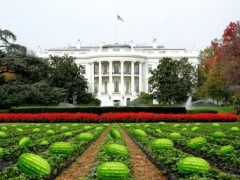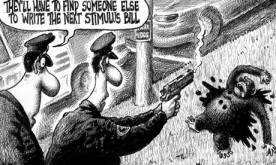
Image distributed by Los Almitos Mayor Dean Grose, showing the White house lawn prepped for the annual Watermelon hunt. Grose is claiming he was unaware of the racial stereotype that Black people love watermelon.
Lest anyone was having trouble remembering that we are now living in a post-racial America, here are a few reminders.
In Los Alamitos, Mayor Dean Grose has come under fire for sending a doctored photo titled “No Easter egg hunt this year.” Offended recepients, including Keyanus Price, a Black businesswoman, have demanded an apology from the mayor. Speaking in his own defense, the mayor claimed that he had no idea there was a racial stereotype involving Black people and watermelons.

Rupert Murdoch, owner of the New York Post, issued a reluctant apology for the above cartoon, drawn by Sean Delonas.
Other examples of post-racialism at work have attracted nationwide attention. Take, for example, the New York Post cartoon in which two White officers shoot dead a chimpanzee, and one of the officers says to the other, “They’ll have to find someone else to write the next stimulus bill.” While the Post and its supporters tried to argue that the cartoon ape and the reference to the stimulus bill were not coded racist references to President Barack Obama, there is no escaping the association. Although admittedly the president is not the bill’s author, a cursory Google search on the term “stimulus bill” turns up tons of articles that reference Obama in their opening paragraphs (see also here). So while the cartoonist may want people to believe that the link was unintentional, the reality is that on one hand, the ape has long been used as a racist caricature of Black people, and on the other hand, there is a long history of White people doing violence to Black people. When the links among the stimulus bill and Barack Obama, the history of police violence towards Black men, and the ape as a racist caricature are considered, it’s hard—if not impossible—not to see the racist overtones in this cartoon.
Sadly, some of the other signs of post-racialism are much more real than a doctored photo or a newspaper cartoon, and the town of Paris, Texas provides a few examples. Paris is where a 14-year-old Black girl was sentenced to seven years in a juvenile prison for pushing a hall monitor. The sentencing judge had earlier sentenced a young White girl to probation for arson! Paris is also home to Turner Industries’ pipe factory, whose Black employees are complaining that nooses, confederate flags, and racist graffitti are prominently displayed all over their workplace.
Ah yes! We are living in heady times! Post-racial fever is sweeping the nation and everybody’s catching the bug! According to CNN, there has been a huge upswing in the number of Americans joining hate groups. Don Black, a former Ku Klux Klan Grand Wizard (what an unfortunate last name for a KKK Grand Wizard!?), told the cable news network that 2,000 people joined his online hate group the day after Obama’s inauguration: prior to the inauguration, he got about 80 new members a day. More HERE
Cross posted at African American Political Pundit.com











